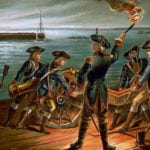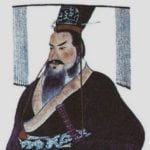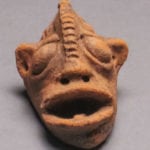 Health
Health  Health
Health  History
History Top 10 Historical Disasters Caused by Someone Calling in Sick
 Animals
Animals 10 New Shark Secrets That Recently Dropped
 Movies and TV
Movies and TV 10 Forgotten Realities of Early Live Television Broadcasts
 Technology
Technology 10 Stopgap Technologies That Became Industry Standards
 Weird Stuff
Weird Stuff 10 Wild Facts About Taxidermy That You Probably Didn’t Know
 Travel
Travel 10 Beautiful Travel Destinations (That Will Kill You)
 Miscellaneous
Miscellaneous 10 Modern Marriage Rituals Born from Corporate Branding
 Weird Stuff
Weird Stuff Ten Bizarre Visions of 2026 from Fiction
 Weird Stuff
Weird Stuff The 10 Unluckiest Days from Around the World
 Health
Health 10 Everyday Activities That Secretly Alter Consciousness
 History
History Top 10 Historical Disasters Caused by Someone Calling in Sick
 Animals
Animals 10 New Shark Secrets That Recently Dropped
Who's Behind Listverse?

Jamie Frater
Head Editor
Jamie founded Listverse due to an insatiable desire to share fascinating, obscure, and bizarre facts. He has been a guest speaker on numerous national radio and television stations and is a five time published author.
More About Us Movies and TV
Movies and TV 10 Forgotten Realities of Early Live Television Broadcasts
 Technology
Technology 10 Stopgap Technologies That Became Industry Standards
 Weird Stuff
Weird Stuff 10 Wild Facts About Taxidermy That You Probably Didn’t Know
 Travel
Travel 10 Beautiful Travel Destinations (That Will Kill You)
 Miscellaneous
Miscellaneous 10 Modern Marriage Rituals Born from Corporate Branding
 Weird Stuff
Weird Stuff Ten Bizarre Visions of 2026 from Fiction
 Weird Stuff
Weird Stuff The 10 Unluckiest Days from Around the World
10 Divisive Demagogues Throughout History
Since the rise of Donald Trump in US politics, the word “demagogue” has been widely used in the press to describe him. It’s a controversial term, as one person’s demagogue can be another person’s inspirational leader. The word itself comes from the Greek word dema, meaning “people,” and gogue, meaning “leader.” In modern usage, it refers to someone who appeals to emotions and prejudices to further their own political ends.
The troubling issue with demagogues is that not only do they distort logic and truth, but they stir up the masses and sow deep divisions in society. The black and white thinking and hostile rhetoric toward the “other” that they encourage is damaging to the fabric of society and critical thought.
Nevertheless, demagogues have been a societal staple since ancient times. Wherever there are segments of society that can be riled up, there will be demagogues. Well-known demagogues include Huey P. Long, Joseph McCarthy, and Father Charles Coughlin, a precursor to modern talk radio. Here are some lesser-known historical figures who have earned the label of “demagogue.”
10 Cleon

Cleon of Athens nearly brought Athens’s democracy to its knees. His acts of oppression were many, but it was his attempted genocide of a vanquished people that earned him a reputation as one of the most brutal demagogues in history.
What is called “the Mytilenean debate” is found in a passage in Thucydides’s The Peloponnesian War. The debate was on how to deal with the rebellion of Mytilene, a city that Athens had conquered. The Athenians were angry. They wanted to execute not only those who had rebelled, but every male citizen of the city. The order was given, but after some reflection, the Athenians had second thoughts.
Cleon soon stepped in and argued for the kill order to stand. Slamming his hand against his thigh, he asserted that to not kill the Mytileneans would be a sign of weakness. He also turned against his audience, insisting that their empathy is why they needed people like him to make decisions for them. He told them that intellectuals were not capable of dealing with such difficult matters, where “lack of learning combined with sound common sense is more helpful than the kind of cleverness that gets out of hand.”
In essence, Cleon’s argument became an invective against democracy itself. But his opponent, Diodotus, stepped in and defended the role of free speech in a democracy. He called for deliberation and argued that leniency would be in the best interests of the Athenians, for if rebellious enemies would know they are to be obliterated, they will fight bitterly to the end.
In the end, reflection on the recklessness that Cleon espoused encouraged self-restraint among the Athenians and helped to improve their democracy.
9 Lewis Charles Levin
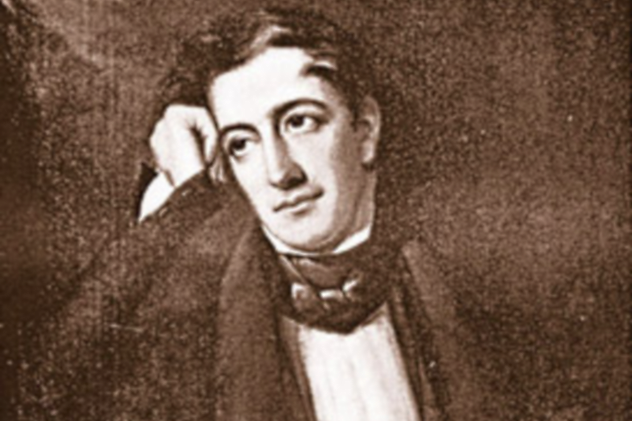
Levin was a self-styled crusader who made coarse appeals to the US public. He was obsessed with a single idea—the protection of national culture against the “danger of subversion by the influx of that horde of aliens, who combine to break down its barriers, that they may command in the citadel, or overrun the land.” His declared enemy was Roman Catholicism, which he saw as an instrument of “alien” criminals of Europe.
Born in Charleston, South Carolina, in 1808, Levin was the son of Jewish parents. There is some debate if the cultural alienation that he felt had some influence on his hatred of Catholics. While teaching school in Mississippi, he was badly wounded in a duel, which made the abolition of dueling his first crusade. He also spent time in prison for a debt he couldn’t pay.
He settled down in Philadelphia, where he became the editor of The Temperance Advocate. There, he turned his crusade against alcohol and became the president of the Pennsylvania Temperance Society in 1843. He thought the abolition of alcohol would bring economic equality.
In 1843, when Levin sold The Temperance Advocate and purchased The Daily Sun, he took his demagoguery to a whole new level. His new obsession was with the nation’s increasing Irish Catholic population. He feared that the Roman Catholic Church was plotting to conquer the US, not by force but through the election process. He also served as a leader of what was called the Native American Party (a term that had a different connotation back then).
On May 3, 1844, the anti-Catholic fervor came to a boiling point. There was a gathering of the Native American Party in Kensington, not far from Philadelphia. The party made insulting boasts that roused both Catholics and non-Catholics alike. Opponents attempted to break up the gathering without the use of violence. In retaliation, the angered Nativists threatened to burn down St. Michael’s Church.
Three days later, they held another meeting, this time armed with weapons. An argument occurred between an Irishman and a Nativist, who drew his weapon. Soon, terrible riots began to plague Philadelphia and the surrounding area. The Nativists threatened to burn down every Catholic church in the city.
After the riots, Levin rode the wave of anti-Catholicism and was elected to Congress from 1845 to 1851. In 1848, he gave a speech in the House of Representatives, railing against the pope and Catholics. In the end, Levin’s obsessive mission to rid the nation of foreign influences took its toll. When he died in 1860, his mind had degenerated to insanity.
8 Karl Lueger
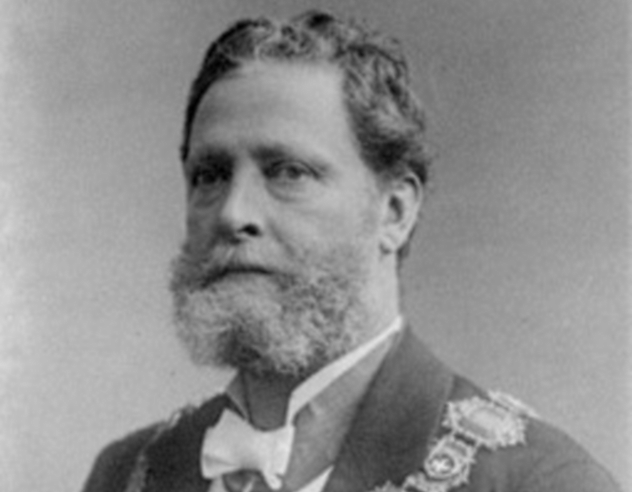
The mayor of Vienna from 1897 to 1910, Karl Lueger was the leader of the Austrian Christian Social Party. He would often speak of the time before 1848 as Vienna’s golden age. Many thought that the city’s crisis at the time was brought by belated modernization, feudalistic conservatism, and capitalism.
Lueger appealed to people, such as small traders, who felt that they had been left behind during modernization. They felt they had lost to the liberals and Social Democrats at the time. The Christian Social Party had become the place for Catholics and anti-liberals.
Lueger spoke the Viennese dialect well and became a celebrity in the city. He was said to be more popular than any actor and more famous than any scholar. He presented an image that was paternalistic and fatherly. He spearheaded a form of populism that divided individuals into an “us” and “them.” By 1900, his political machine represented not only the small traders, but also an imagined ideal of preindustrial Vienna. But his personality and actual politics were regressive, authoritarian, paternalistic, and anti-Semitic.
In the 1880s, he supported a bill to block Jewish immigration into Vienna, though his anti-Semitism was more based in economics than ideology. He sought to battle liberalism and capitalism, both thought of as being culturally Jewish. A saying commonly attributed to Lueger is, “I say who a Jew is.”
Regardless of Lueger’s motivations, his anti-Semitism was damaging all the same. He quoted one of Vienna’s wildest anti-Semites by saying that the “Jewish problem” would be solved by placing all Jews on a large ship to be sunk on the high seas. His career and statements eventually made an impression on a young man named Adolf Hitler.
7 Marcus Garvey
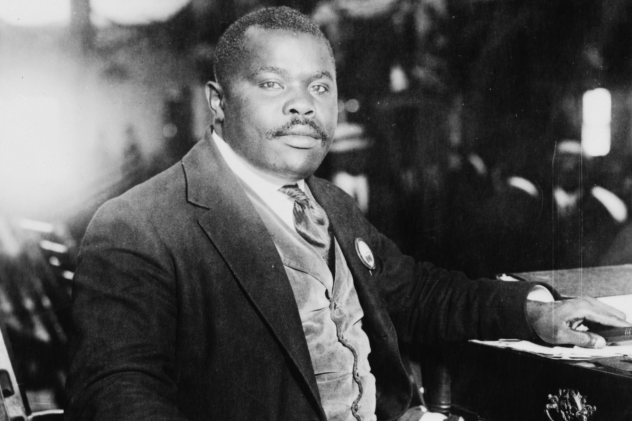
Some have called him an inspiring activist, while others saw him as a dangerous demagogue. Jamaican-born Marcus Garvey was a fervent black nationalist who promoted African-American resettlement in Africa.
In Garvey’s words, August 1, 1920, was “a red letter day for the Negro peoples of the world.” A convention was sponsored by the organization that Garvey had founded, the Universal Negro Improvement Association (UNIA). UNIA promoted racial pride and improving the conditions for blacks worldwide. Garvey gave the opening address, and his call was to overturn white rule in Africa and reclaim the continent for the world’s black population.
Garvey was born on August 17, 1887, in St. Ann’s Bay, Jamaica. His parents were descendants of African slaves brought to the West Indies by the British to work the sugarcane fields. His father became a mason and a well-read man. Garvey deeply admired his intellect and boldness. His mother was a conscientious Christian.
At 14, Garvey traveled to Kingston, where he became a printer’s apprentice. There, he played a part in an unsuccessful union strike, which inspired his political activism. After attending Birkbeck College in London, he worked for The African Times and Orient Review, which advocated Pan-African nationalism. He eventually found his way to the United States.
He soon founded UNIA, where he was no stranger to controversy. Some black leaders found his separatist philosophy counterproductive. W.E.B. Du Bois, a prominent black leader and cofounder of the NAACP, called Garvey “the most dangerous enemy of the Negro race in America.”
Garvey garnered this reaction when he became increasingly radical in his tactics. He even had secret meetings with the Ku Klux Klan, who agreed with Garvey’s plan to take America’s black population to Africa. White supremacist senator Theodore Bilbo was so happy with Garvey’s proposal that he recommended that the US Senate support it. Du Bois was taken aback. At that point, he wrote his opinion piece in the journal Crisis, asking if Garvey was “a lunatic or traitor.”
In 1922, Garvey and three other UNIA officials were charged with mail fraud involving the Black Star Line, Garvey’s shipping company, which established trade between Africans across different countries. On June 23, 1923, he was sentenced to five years in prison. Garvey maintained that he was a victim of political persecution. In 1927, he was released and deported to Jamaica.
6 Ma And Pa Ferguson
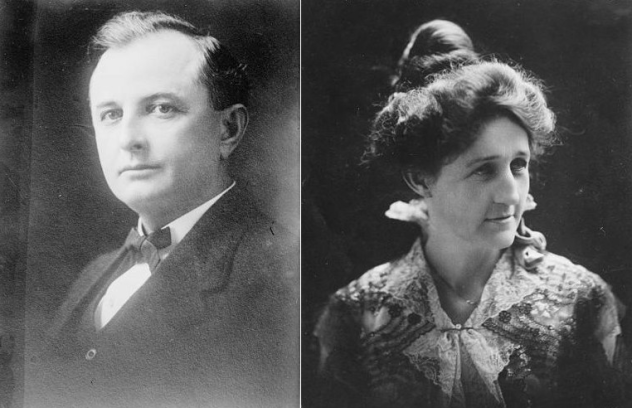
James and Miriam Ferguson were a force in Texas politics from 1915 to 1940. Although the couple took advantage of the poor and uneducated, they were surprisingly forward-looking in bucking the trends of the Ku Klux Klan and Prohibition. However, their policies were hardly based on principle. James was governor from 1915 to 1917, impeached early in his career. He enhanced his $4,000 salary with an anonymous donation of $156,000 from mysterious brewers.
Impeachment or not, the Fergusons’ motto was, “Never say die, say damn!” Soon, Ma Miriam was promoted as the next candidate for Texas governor. Ma’s slogan was “Two governors for the price of one.” She astounded both her opponents and political pundits by winning the 1924 gubernatorial race. She became the first woman to be elected governor in the United States.
Although she was a college-educated woman, Ma Ferguson played the role of a hayseed rural to appeal to the Texas electorate. She posed with a donkey, representing the Democratic Party, and wore a borrowed bonnet. Ma borrowed Pa’s policy of opening the prison gates, fueling rumors that he was selling pardons. Ma granted clemency to 3,595 convicts at a time when Texas’ population was less than a fifth of what it is now.
Ma and Pa got away with many of their shenanigans due to their reputation as crusaders for the rural community. The pair were often described as cartoonish, witty, and colorful. But their playful personalities hid their unethical practices and abuse of power.
5 Theodore Bilbo
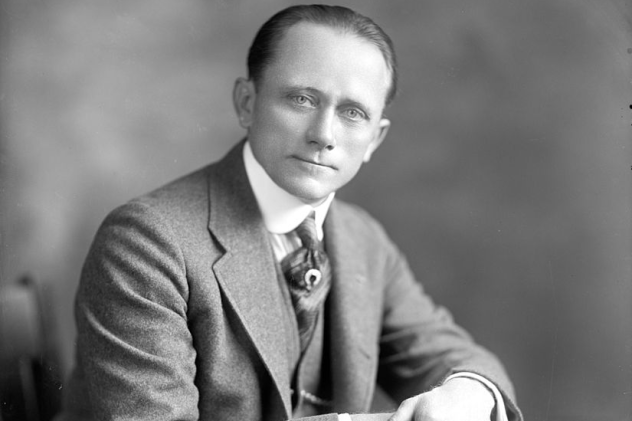
Born in 1877, Mississippi’s most dominant personality during the era of segregation was Theodore Bilbo, a fiery man who expressed himself in an extravagant style. His lack of civility made him notorious in his own state and beyond. He was known in Mississippi as “The Man” and described himself a strutting peacock. He refused to reveal his exact height (around 165 centimeters [5’5″] ), though a fellow Mississippian joked that he was 239 centimeters (7’10”) when on the stump.
When Bilbo became governor in 1915, he indulged in his love for poor whites (and contempt for blacks) and stirred up resentment of rich people and corporations. He was involved in a number of scandals, including one where he blamed a South African tick for spreading disease to cattle. He told farmers to dip their cattle into chemical vats, which the farmers feared would kill their cattle. Someone went so far as to dynamite the vats.
After his governorship, he ran a gaudy and obnoxious campaign for the US Senate. He promised voters everything he could think of and blasted his enemies as “farmer murderers, corrupters of Southern womanhood, and skunks who steal Gideon Bibles from hotel rooms.” He claimed that the state was full of Communism and that he was needed to clean it up.
He won and arrived in Washington, DC, in 1935, promising to “raise more hell than Huey Long.” He was known for his famous filibusters. He once attacked the nomination of a judge for the Fifth Circuit Court of Appeals for five solid hours. It turned out that the judge, Edwin R. Holmes, had once sentenced Bilbo to 10 days in jail for refusing to testify at the trial of a fellow politician, who was accused of seducing a stenographer.
During his Senate career, he was most notorious for his vicious racism, introducing absurd bills to resettle America’s black population in West Africa. His biggest controversy came when he became chairman of the District of Columbia Committee and became known as the “unofficial mayor of Washington.” He took the position as a platform to rail against the city’s growing black population, demanding that they move out within the year.
While severe racism was a reality in 1940s Washington, the establishment avoided the vile language of Bilbo. He was criticized in polite circles. Congress began to look into his possibly unethical offering of war contracts for generous payoffs. While an effort to unseat him was underway, Bilbo died in his home in Poplarville, Mississippi.
4 Anita Bryant
Former Miss America runner-up and recording artist Anita Bryant became a center of controversy when she led a crusade against gay rights in 1977. After Dade County, Florida, passed an ordinance to prevent discrimination on the basis of sexual preference, Bryant protested on the grounds that, “Recruitment of our children is absolutely necessary for the survival and growth of homosexuality.”
In 1969, Bryant became a spokesperson for the Florida Citrus Commission and starred in a number of orange juice commercials. That year, she also sang at the Rally for Decency in Miami in protest to The Doors singer Jim Morrison exposing himself. Eventually, she became the figurehead of Save Our Children from Homosexuality, Inc. (SOC). SOC organized against the Dade County ordinance, claiming that it would “discriminate against children’s rights to grow up in a healthy, decent community.”
Bryant and the SOC worked with conservative churches and Orthodox synagogues, gathering enough signatures to have the ordinance put on a public referendum. On June 7, 1977, the gay rights ordinance was repealed by a 69 percent majority of voters. The referendum set off a number of legislative and electoral backlashes against gay rights.
Bryant and the SOC perpetuated the notion that gays sought to molest children or convert them to homosexuality. The SOC changed its name to Protect America’s Children and assisted efforts to ban gays and lesbians from being schoolteachers.
In 1977, Bryant held a press conference to promote her book, The Anita Bryant Story: The Survival of Our Nation’s Families and the Threat of Militant Homosexuality. Bryant and her husband sat at a table surrounded by a news crew when a man in a suit and tie stepped into the frame of the camera and hit her squarely in the face with a banana puree and meringue pie. “Well, at least it’s a fruit pie,” Bryant quipped before praying with her husband.
Bryant’s career began to suffer after the Dade County vote. She lost her job as spokesperson for the Florida Citrus Commission. Her musical tours were protested by gays and lesbians. In 1978, Bryant and her husband began giving religious counseling to convert gays to heterosexuals. Over time, her public appearances became less common. She remarried in 1990 and attempted to resurrect her career by singing in Arkansas, Missouri, and Tennessee.
3 Shintaro Ishihara
In 2012, Shintaro Ishihara, the controversial governor of Tokyo, announced that he was quitting local politics to start a national party. He then pushed Japan to abandon its pacifist constitution and to develop nuclear weapons. Despite his influence, Ishihara has been considered far too right-wing to build a party large enough to form a government.
Ishihara was once a novelist who wrote the 1989 book The Japan That Can Say No, which proposed a more assertive policy toward the United States. Due to his rhetoric, he made few advances in national politics. He retired in 1995 only to return in 1999 as mayor of Tokyo, where his right-wing populism won four terms. However, other voters remained wary of his reputation as a firebrand.
Throughout his career, Ishihara made a series of gaffes that made him the center of controversy. He has said that the 2011 tsunami was “divine punishment” for Japan’s economic decline and described the 1937 Japanese slaughter of 300,000 civilians in Nanjing as a fabrication. He appealed to many voters when he downed a glass of Tokyo’s drinking water at the height of the Fukushima nuclear crisis.
He also made derogatory comments about women and foreigners and dismissed French as a “failed international language.” In 2010, after watching same-sex couples in a San Francisco parade, he suggested that gay people were “deficient.” His fervent nationalism can even be found in a screenplay he wrote for I Go to Die For You, a 2007 movie that glorifies kamikaze pilots in World War II. He once said, “I’m 80 years old, and I ask myself: Why does it have to be me? Why can’t the young get their act together? But if Japan keeps going like this, it will sink into a pit and die.”
An unabashed nationalist, Ishihara sparked a diplomatic crisis with China in April 2012 when he announced plans to buy the Senkaku islands, which are claimed by both countries, and bring them under the Tokyo government. This forced the hand of Japan’s prime minister, Yoshihiko Noda, to offer a rival bid to buy the islands and prevent them from falling into Ishihara’s hands.
2 Udo Voigt
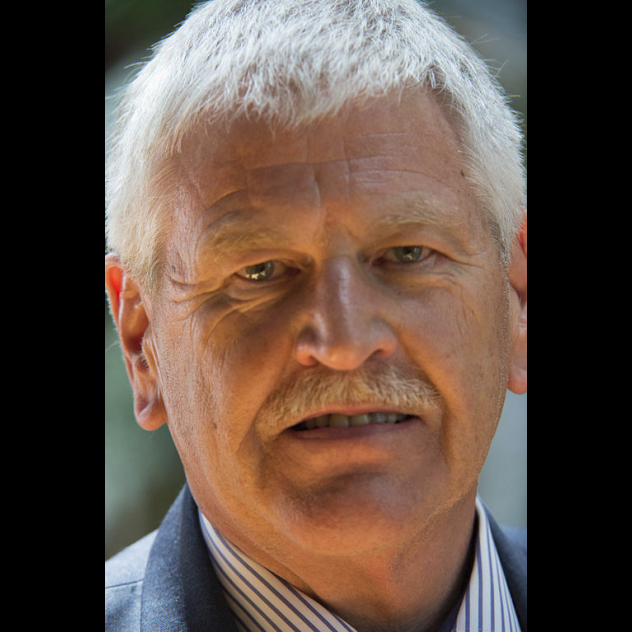
Udo Voigt is a German politician who has served as a member of the European Parliament since 2014. He’s the former head of the National Democratic Party of Germany (NPD), an organization that Germany’s interior intelligence considers to be far-right. While Voigt was the party leader from 1996 to 2011, he took it in an even more nationalist direction.The extreme nature of the NPD even prompted a failed attempt by Germany’s federal court to outlaw it.
In 2004, Voigt described Hitler as “a great German statesman” and dismissed the current democratic German republic as “an illegitimate system.” He also suggested that Hitler’s deputy, Rudolf Hess, should be a candidate for the Nobel Peace Prize.
Voigt joined the NPD at age 16 and stayed in the party even when it cost him his job in the military. When he took over the party, he went against the wishes of other party members and recruited young neo-Nazis. In 2005, Voigt received a four-month suspended sentence for incitement of the people. He called for an armed uprising against the state at a 1998 rally.
Voigt has made contact with a number of white nationalists, including former Ku Klux Klan Wizard and anti-Semite David Duke. In 2006, Duke interviewed Voigt on his web radio show and described him as “the true chancellor of Germany.” Voigt said that the NPD was “working to get the control of Germany, but Germany is still an occupied country.”
In a 2007 TV interview given to Iranian journalists, Voigt claimed that “no more than 340,000” Jews had died in the Holocaust. Six million is the figure accepted by most historians. In 2012, he received another suspended sentence and a fine of €1,000, for glorifying the actions of the Waffen-SS. He described the Nazi salute as a “peace greeting” and called for an end to its ban in Germany.
Another hardliner, Udo Pastoers, who temporarily headed the NPD, was charged with inciting racial hatred after attacking Germany as a “Jew Republic” and calling the Turkish minority “semen cannons.”
A common theme of NPD rhetoric is fervent nationalism based on ethnic identity. Voigt has said, “We will try to build alliances to fight against foreign infiltration. [ . . . ] We want Europe to be a union of fatherlands and ethnicities.”
1 Geert Wilders
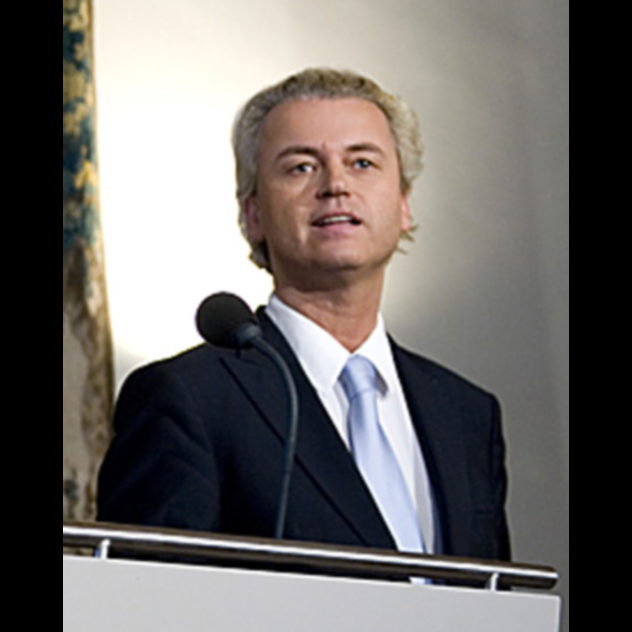
Dutch politician Geert Wilders leads the Freedom Party, an anti-Islam party that is surging in Holland. Once only a household name in the Netherlands, his influence has been spreading since he recently backed Donald Trump.
Wilders has taken advantage of the rise of anti-immigrant sentiment across Europe that has been stoked by sex attacks allegedly committed in part by migrants and refugees on December 31, 2015, in Cologne, Germany. In January 2016, Wilders held a rally in the Dutch town of Spijkenisse, where he handed out fake pepper spray to women. He warned them of “Islamic testosterone bombs.”
Wilders has made a name for himself as a far-right populist. He separated from Holland’s center-right party (the VVD) to carve out a niche with his own anti-Islam platform. He wrote a book titled Marked for Death: Islam’s War Against the West and Me, which was published in 2012.
In a post to his Twitter account, Wilders backed Donald Trump around the same time that the US Republican candidate made his controversial statement suggesting that Muslims should be banned from entering the country. Wilders said that Trump would be “good for America and good for Europe.” His tweet included an image of stars and stripes, and he added, “We need brave leaders.”
Recently, European Commission president Jean-Claude Juncker offered a plan to distribute refugees from Iraq and Syria among the EU states. Wilders called the migrant influx “an Islamic invasion” that threatened Europe’s “prosperity, security, and identity.”
In a YouTube video, he also addressed Turkish president Recep Tayyip Erdogan. He told him to “forget about” joining the EU. He said, “Just forget it. You’re not Europeans and will never be. An Islamic state like Turkey doesn’t belong in Europe.” Wilders described Erdogan as “a dangerous Islamist who is raising the Islamic flag.”
Wilders has benefited greatly from his rhetoric, increasing in popularity. Many agree with his bold stance on Islam. But it has also encouraged volatile behavior, such as in the town of Nijmegen, where local people were to cook with asylum seekers at a nursing home. The meal had to be canceled when the nursing home received threats.
B.C. Bailey is a content crafter working at the intersection of design, writing, and wondering. You can check out his blog at bcbailey.be.

